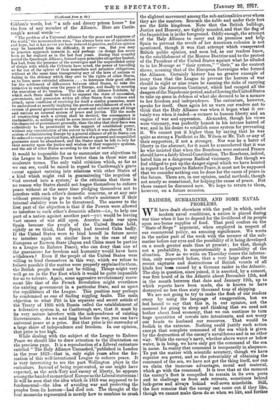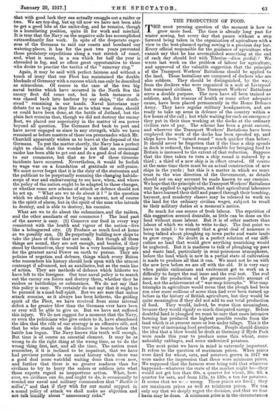RAIDERS, SUBMARINES, AND SOME NAVAL PROBLEMS.
WE have dealt elsewhere with the peril in which, under modem naval conditions, a nation is placed during war time when it has to depend for the livelihood of its people upon sea-borne supplies of food. That peril confers on the " State of Siege " argument, when employed in respect of our commercial policy, an amazing significance. We wrote in the earlier part of the week with the menace of the sub- marine before our eyes and the possibility of it being developed on a much greater scale than at present ; for that, though not a probability, is unquestionably a possibility of the situation. Now as we write on Thursday comes the informa- tion, only suspected before, that a very large share in the recent captures and destructions of British vessels of all kinds has been caused by a German raider in the Atlantic. The ship in question, since joined, it is asserted, by a consort, was first heard of in the Atlantic about December 12th, and in the month between that date and January 12th, up to which reports have been made, she is known to have destroyed no less than sixty thousand tons 'of shipping. We are not going to try to make the flesh of our readers creep by using the language of exaggeration, but we feel bound to say that this is, in our opinion, not the moment for going to sleep and thinking that we need not bother about food economy, that we can continue to turn huge quantities of cereals into intoxicants, and not worry our heads to husband our resources. That would be foolish in the extreme. Nothing could justify such action except that complete command of the sea which is given by the destruction of the enemy's naval forces and in no other way. While the enemy's navy, whether above water or below water, is in being, we have only got the command of the sea in name. In reality that command is temporarily in abeyance. To put the matter with scientific accuracy, though we have superior sea power, and so the potentiality of obtaining the command of the sea, we have not got the thing itself, nor can we claim the immense advantages, moral and material, which go with the command. It is true that at the moment the enemy's fleet is compelled to remain in its own ports and to challenge us from safe retreats, sometimes behind lock-gates and always behind well-sown minefields. Still, the feet remains that the enemy can come out if they like, though we cannot make them do so when we like, and feather that with -good luck they can actually smuggle.out a raider or two. We are top-dog, but up till now we have not been able to get a good bite at the under-dog, and he remains, though tin a humiliating position, quite fit for work and mischief. It is true that the Navy on the negative side has accomplished extraordinarily fine work. In spite of the desperate eager- ness of the Germans to raid our coasts and bombard our watering-places, it has for the past two years prevented those predatory. expeditions along a vast stretch of coast, and, what is more, in a sea which for half the year is shrouded in fog, and so offers great opportunities to those who desire to practise the tactics of the " runaway ring."
Again, it may be said with perfect fairness and without a touch of irony that our Fleet has maintained the double blockade of Germany with a success which can only be described as miraculous. Of course in the case of the two big maval battles which have occurred in the North Sea the enemy fleet did come out, but in both instances it was chased back into harbour by our ships, " the death- stead " remaining in our hands. Naval historians may debate for as long as they like as to what was done, should or could have been done, at the battle of Jutland, but the plain fact remains that, though we did not destroy the enemy fleet, we placed our superiority in the matter bf sea power beyond all question. The Germans fled back to port and have never engaged us since in any strength, while we have remained as before masters of those sea promenades which Mr. Churchill apparently wishes us to leave at the disposal of the Germans. To put the matter shortly, the Navy has a perfect right to claim that the wonder is not that an occasional raider has been able to get out and do a good deal of damage to our commerce, but that so few of these tiresome incidents have occurred. Nevertheless, it would be foolish to wage war on a foundation of gratitude or self-praise. We must never forget that it is the duty of the statesman and -the publicist to be perpetually scanning the changing kaleido- scope of war and endeavouring to see how, when, and where the policy of the nation ought to be adapted to those changes, or whether some new scheme of attack or defence should not be set up. " What are we to do about it ? " is the question which we should always be trying to answer, not of course in the spirit of alarm, but in the spirit of the man who intends to destroy, and is able to destroy, his enemies.
What are we to do about the submarines, and the raiders, and the other assailants of our commerce ? The land part of the .answer is easy. (1) Conserve our food in every way consistent with the health and vigour of the nation—live like a beleaguered city. (2) Produce as much food at home as we possibly can. (3) Be perpetually building new ships to take the place of those that are sunk. But though all these things are sound, they are not enough, and besides, if they stood by themselves, they would be a very humiliating policy for the greatest naval Power on earth to pursue. They are policies of negation and defence, things which every Briton who remembers his history should look upon with the utmost contempt if advanced, not as auxiliaries, but as the main line of action. They are methods of defence which hitherto we have left to the foreigner. Our true naval policy is to search out the enemy sea forces and destroy them, whether they be raiders or battleships or submarines. We do not say that this policy is easy. We certainly do not say that it ought to be pursued in a mad-bull spirit. But we are sure that unless attack remains, as it always has been hitherto, the guiding spirit of the Fleet, we have received from some internal defect a far greater blow than the Germans ever have been or ever will be able to give us. But .we have not suffered this injury. We "do not suggest for a moment that the Navy, or even the politicians who give orders to it, have abandoned the idea that the role of our strategy is an offensive role, and that he who stands on the defensive is beaten before the battle has begun. The Navy knows this truth well enough. But time is of course an essential element. It may be as wrong to do the right thing at the wrong time, as to do the wrong thing first, last, and all the time. The nation must remember, if it is inclined to be impatient, that we have had previous periods in our naval history when there was a good deal more watchful waiting done than even now, and further that there is no greater madness than for civilians to try to hurry the sailors or soldiers into what those experts regard as inopportune action. What, how- ever, we civilians can do, and ought to do, is occasionally to remind our naval and military commanders that " Barkis is willin'," and that if they wish for our moral support in a sound policy of attack we shall make no objection and not talk timidly about " unnecessary risks."



































 Previous page
Previous page